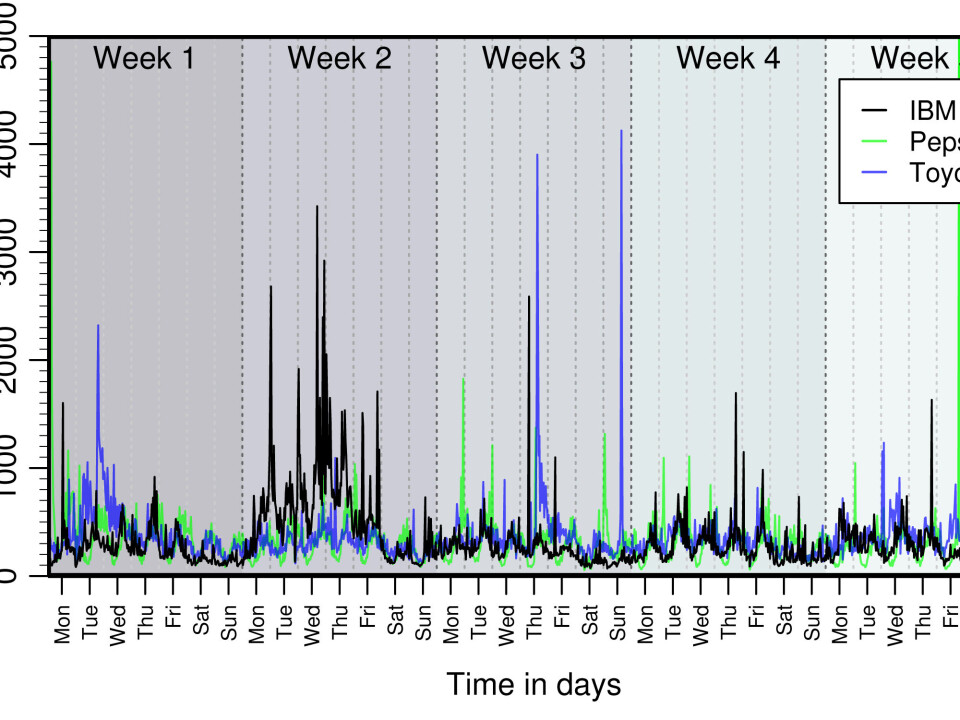
Tweeting turns us into lemmings
There is a clear lemming effect on the internet, where we’re keen to show that we like the same things as our peers. But we also quickly lose interest again, new study reveals.
In the small villages, people are gossiping as they have always done. There is also a great deal of gossip in the global village where everyone is linked via the internet, and on a social medium like Twitter, messages are spread at impressive speeds.
We no longer need to know each other to affect each other. Social media has changed the way we interact with other people, and that prompted scientists from Copenhagen and Oslo Universities to take a closer look at this phenomenon.
“In our group, we study collective phenomena in which many components interact in complex ways. And then we try to find patterns in the systems,” says lead author Joachim Mathiesen, an associate professor at the Niels Bohr Institute at the University of Copenhagen.
“We wanted to understand more about social networks so we started studying Twitter data. Twitter has the advantage that it’s easy to get a lot of data on a lot of people. We then tried to find patterns in the Tweeters’ behaviour to see if these patterns also applied elsewhere.”
Tweeting is like stock trading

The researchers found that Tweeters behave to a great extent like people who trade shares on the stock exchange. When something new happens on the stock market, the stock traders jump collectively on one particular stock, which is bought and sold much more intensely than usual, and the effect is self-reinforcing: when people see that a stock is being traded a lot, they want to trade that stock too.
”The patterns we’re seeing in social activities are actually very similar to the one we see on the stock exchange,” says Mathiesen.
”Twitter users suddenly become activated by some event going on in society. This activation has a cumulative effect, so that many others will soon be writing about the same issue. We influence one another, and we have tried to quantify this cumulative effect and now we have developed a model for it.”
Brand names grab our attention on Twitter
The researchers wrote a computer program that automatically collected data from Twitter. The program monitored whether people wrote about various international brands such as Apple, Pepsi and Toyota – brands that people all over the world can relate to.
Twitter users suddenly become activated by some event going on in society. This activation has a cumulative effect, so that many others will soon be writing about the same issue. We influence one another, and we have tried to quantify this cumulative effect and now we have developed a model for it.
They observed how periods with steady and peaceful activity were replaced by explosive and brief upswings in activity levels when many users suddenly were encouraged to write about the brand.
When coffee chain Starbucks for instance launches a new product, there will soon be a number of people tweeting about having tasted the new kind of coffee, and then those who read these tweets are encouraged to write about their own experience with it. This creates a kind of global awareness about the product – an awareness that the researchers can now measure.
Famous in twenty minutes on Twitter
When conversations travel from mouth to mouth in the village, it takes days or weeks for a rumour to make the rounds, but on the internet things go much faster. However, in the latter case, people also quickly lose interest again, explains the researcher.
“The time scale has changed in relation to village gossip in the old days. On Twitter, you get the greatest fame after 15-20, and after 24 hours the attention dies out entirely,” he says.
This is a form of lemming effect – a desire to be seduced by the moment. There are of course many subtleties that we haven’t covered, but our model may tell us something about human behaviour. When people suddenly start relating to a topic, other people also start relating to it. The fact that someone has already related to something activates other people. It is this insight that we’re trying to provide with our model.
”This is a form of lemming effect – a desire to be seduced by the moment. There are of course many subtleties that we haven’t covered, but our model may tell us something about human behaviour.
“When people suddenly start relating to a topic, other people also start relating to it. The fact that someone has already related to something activates other people. It is this insight that we’re trying to provide with our model.”
----------------------
Read the Danish version of this article at videnskab.dk







